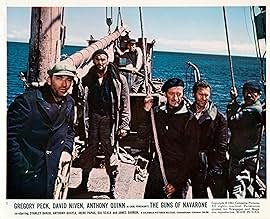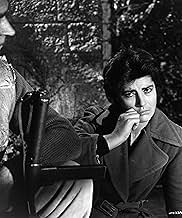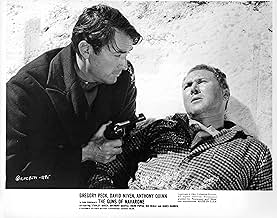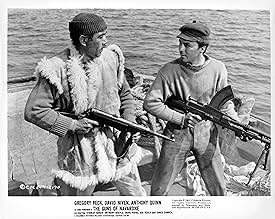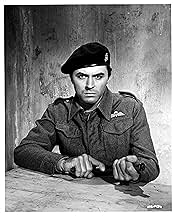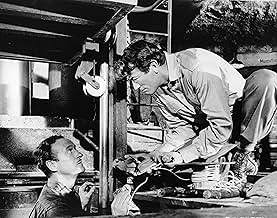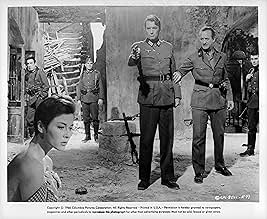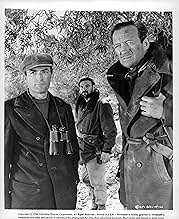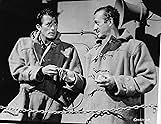Durant la Seconde Guerre mondiale, un commando est chargé d'une périlleuse mission : détruire deux énormes canons allemands situés sur l'île de Khéros.Durant la Seconde Guerre mondiale, un commando est chargé d'une périlleuse mission : détruire deux énormes canons allemands situés sur l'île de Khéros.Durant la Seconde Guerre mondiale, un commando est chargé d'une périlleuse mission : détruire deux énormes canons allemands situés sur l'île de Khéros.
- Réalisation
- Scénario
- Casting principal
- Récompensé par 1 Oscar
- 4 victoires et 12 nominations au total
Avis à la une
What I noticed on first viewing was how quiet it is. Many scenes take place without dialog or score, merely background noises like wind, feet crunching gravel, and the like. Some of the tensest scenes are made more so by our hearing only what the characters would hear. For example, early on in the film, the lead characters undergo a storm at sea and approach a dangerous narrows, and until the scene's climax, all we hear are howling wind, driving rain, and slamming waves.
A musical score tells viewers how they are supposed to feel and often telegraphs shifts in plot or mood. As used in this film, the absence of music heightens the drama and makes the action more immediate. What score there is is thus more effective, earning its composer an Academy Award.
This simplistically summarizes the moral dilemmas at the heart of Alistar MacLean's classic novel and the superb Carl Forman film from which followed. The Guns Of Navarone at first looks like a basic mission - in 1943 a key channel in the Aegean Sea is commanded by two gigantic German siege batteries on the island of Navarone; these guns prevent the reinforcement of a British island garrison nearby, and if the garrison falls, it will persuade Turkey to join the Axis powers, an outcome Berlin is counting on as the war in Russia has turned against it with the defeat at Stalingrad.
The guns cannot be bombed by air, despite heroic efforts by the RAF, and so is brought in a key Allied operative who has been working in occupied Crete since its fall to the Germans in 1941. Captain Keith Mallory not only can speak the languages of the area with superb fluence, he is "Keith Mallory, the Human Fly," the best mountaineer in the world. He feels he cannot climb the 400 foot precipice atop which the German batteries sit, but he likes nothing better than "a well-organized setup" upon seeing that he has no choice.
With the help of his closest combat comrade Stavro (Anthony Quinn), Mallory is assigned with Major Roy Franklin to ferry British commandos - one of the a wise-cracking explosives expert, Corporal John Anthony Miller (David Niven)- on the perilous journey to the back door of Navarone. But the infiltration is fraught with danger, and when Franklin is badly injured, the real crest of the story unfolds, the moral dilemmas of the team as they must complete the mission while deciding how to handle an injury they cannot treat.
And as if that were not enough, one of the Greek resistance operatives helping the team turns out to be a traitor after Miller finds his explosive equipment has been tampered with. It leads to yet another of the several arguments that ensue through the film between Miller, the soldier who does not want the responsibilities involved, and Mallory, who is determined to finish the job. While one of the arguments doesn't make much sense - Miller is horrified when Mallory admits lying to Roy Franklin so that upon eventual capture Franklin will give away inaccurate information; this is by far the most humane solution to the intolerable dilemma the team has faced - overall the clash between Mallory and Miller adds enormously to the film's tension, thanks in no small part to the excellent performances of Gregory Peck and David Niven.
The sets and props of the film are superb, and overcome the comparative cheesiness of some of the special effects.
When in 1943 the Germans are attempting to bully neutral Turkey into joining the Axis, 2,000 British troops are trapped on the small and strategically unimportant Greek island Kiros. Something has to be done to save them and there is only one way to get there: by boat. But it's impossible to come near to the island because the only sea route is defended by two gigantic German anti-ship batteries, deployed in a massive cliff side bunker on the island of Navarone. An air attack has been attempted before and proved to be useless and the only option that is left is sending a team of six Greek and English mountaineers to meet up with partisans to try and dynamite the guns. The team does not only face the almost impossible task to conquer the difficult terrain, they also have to try to get past a German garrison and to make things worse, there also appears to be a traitor among them...
About one thing I'm already certain: I'll buy this movie on DVD as soon as I can find it. This is one of the better classic war movies that I've seen lately and I really had a good time watching it. Not only does it give a more realistic view on the war, the characters are also a lot more realistic. They aren't as invincible as you sometimes see in other classic war movies (think for instance of "Where Eagles Dare (1968)"), in which the Americans or other allies seem to carry some kind of magic shield around them that can't be penetrated by German bullets, while they can kill hundreds of the enemy with only one bullet. In this movie they have to deal with all kinds of difficulties like difficult terrain, a traitor,... and yes, even the good guys can get killed or wounded.
What I also liked was the fact that this movie was shot in Greece and therefor gave a realistic feeling to the setting, without feeling like a brochure for a romantic holiday (like Captain Corelli's Mandolin). I know, we all expect that and believe that it is normal when we see it, but I've already seen otherwise and it's something you didn't always get at the time. Think for instance of the movie "The Battle of the Bulge" (1965), which was supposed to be situated in the Belgian Ardennes, but which was shot with olive trees in the background and in a desert-like terrain. And trust me, I'm Belgian myself and I know the region all too well, so I know that there really isn't such a type of terrain to be found there.
Next to the good story and the correct decor, this movie also offers some fine acting from a great classical cast. With Gregory Peck, David Niven, Anthony Quinn, Anthony Quayle,... you get some of the most famous actors at the time and they all did a very nice job in this movie. Add to this the fact that story was very good, that the action still looked nice, that everything was shot in the right country and that everybody spoke the correct language. Then you know that there is absolutely nothing more I could ask for in this movie. I give this movie a well deserved 7.5/10.
What makes the film especially good is the crisp dialogue, lines that point up the moral and philosophical argument at the heart of the film and which resonate today as much as then:
Mallory: The only way to win a war is to be just as nasty as the enemy. The one thing that worries me is we're liable to wake up one morning, and find we're even nastier than they are.
Franklin: I can't say that worries me!
Mallory: Well, you're lucky.
Good performances abound, but the best by far is David Niven's Cpl. Miller, a complex character whose smooth front and witty banter conceals much of the conflict of the film. It's he who tangles most often with Gregory Peck's Mallory, and has at least three scenes in the film that are top-rate. We may like Miller because he keeps things humming and provides welcome comic relief, but he's no less the center of the film than Peck or Anthony Quinn, the two well-cast leads whose relationship is enriched, at least from our remove, by the unique vow Stavros has made to Mallory about the unsettled business between them.
The plot is a thing of beauty, moving with all the synchronicity and clever precision of a diabolical cuckoo clock. The special effects have suffered more than a bit from the march of time (though one should remember that was the only part of the film that won an Oscar in 1962). Some process shots are cringe-inducing now. But the pace is still gripping and the payoff spectacular. Here's the film that was the template to every popcorn actioner that came after, its imprint recognizable on everything from the James Bond movies to "Star Wars" to Indiana Jones. That's impressive, but more so is that "Guns" remains as entertaining as any one of them, and more thrilling than most.
The team put together here couldn't be more incongruent with each other. Gregory Peck's world-class mountain climber who becomes the team's reluctant CO, David Niven's hot-tempered, authority-defying sapper, Anthony Quinn's Greek ex-Colonel who has promised to kill Peck at war's end, Stanley Baker's weary soldier who's tired of the unending slaughter, a young Greek national who wants more and more of it...the real miracle is that they manage to get as far and as well as they do. For every step forward, they wind up paying for it. Be it in blood, moral anguish, or pain, no one comes out of this mission unchanged or unscathed. I honestly feel that it is this theme of sacrifice that is the key to the greatness of "The Guns of Navarone".
Le saviez-vous
- AnecdotesThis film was the only time that David Niven, a life-long non-smoker, ever smoked cigarettes on-screen.
- GaffesWhen the Germans are searching the gun positions for explosives, German soldiers are using mine detection equipment and sweeping the tracks leading up to the guns. This is a useless activity since the detection equipment is a metal detector and would give off a signal due to the steel rails.
- Citations
Mallory: Can you do anything at all?
Corporal Miller: I don't know. There's always a way to blow up explosives. The trick is not to be around when they go off. But aren't you forgetting something? The lady. As I see it we have three choices. One we can leave her here but there's no guarantee she won't be found, and in her case they won't need a truth drug. Two, we can take her with us, but that would make things worse than they are already. And three... well, that's Andrea's choice, remember?
Mallory: You really want your pound of flesh, don't you?
Corporal Miller: Yes, I do. You see, somehow I just couldn't get to sleep.
Mallory: Well, if you're so anxious to kill her, go ahead!
Corporal Miller: I'm not anxious to kill her, I'm not anxious to kill anyone. You see, I'm not a born soldier. I was trapped. You may find me facetious from time to time, but if I didn't make some rather bad jokes I'd go out of my mind. No, I prefer to leave the killing to someone like you, an officer and a gentleman, a leader of men.
Mallory: If you think I wanted this, any of this, you're out of your mind, I was trapped like you, just like anyone who put on the uniform!
Corporal Miller: Of *course* you wanted it, you're an officer, aren't you? I never let them make *me* an officer! I don't want the responsibility!
Mallory: So you've had a free ride, all this time! Someone's *got* to take responsibility if the job's going to get done! You think that's easy?
Corporal Miller: [shouts] I don't know! I'm not even sure who really is responsible any more.
- Crédits fousOpening credits prologue: The first day 02.00 Hours An Allied Airfield somewhere in the Middle East
- Versions alternativesTo receive a 'U' certificate the original UK cinema version was overdubbed to remove all of Barnsby's uses of the word 'bloody' (the word was replaced with the less offensive 'ruddy'), and this same print appeared on early video releases. The film was restored in 1993 and all later widescreen releases feature the full unedited version.
- ConnexionsEdited into L'ouragan vient de Navarone (1978)
- Bandes originalesKaragouna
(uncredited)
Traditional
Meilleurs choix
Détails
- Date de sortie
- Pays d’origine
- Langues
- Aussi connu sous le nom de
- Los cañones de Navarone
- Lieux de tournage
- Acropolis of Lindos, Rhodes, Grèce(meeting point of party with Maria and Anna)
- Sociétés de production
- Voir plus de crédits d'entreprise sur IMDbPro
Box-office
- Budget
- 6 000 000 $US (estimé)
- Montant brut mondial
- 20 616 $US
- Durée2 heures 38 minutes
- Mixage
- Rapport de forme
- 2.35 : 1
Contribuer à cette page



